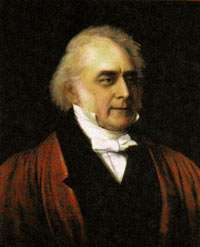William King (physician)
William King (17 April 1786, Ipswich – 19 October 1865) was a British physician and philanthropist from Brighton. He is best known as an early supporter of the Cooperative Movement.

William King was the son of Rev. John King, a master at Ipswich School. One brother, John, was a writer of legal books, and another, Richard Henry was a naval officer who served under Philip Broke – a former pupil at Ipswich School – during the capture of USS Chesapeake. He was born in Lower Brooke Street, Ipswich but the family subsequently moved to Witnesham[1] when his father retired to the rectory there in 1798.[2]
By 1827, Robert Owen had taken his ideas of a co-operative movement to the United States. But they were picked up and amplified by King. King founded a cooperative store in Brighton. Then in 1828 he started a paper, The Co-operator [3] to promote these ideas. The Co-operator had a wide circulation and a great influence in the emerging movement. Though only published for slightly over two years, the paper served to educate and unify otherwise scattered groups. King's articles in the paper gave the movement some philosophical and practical basis that it had lacked before.
King's overriding rationale for the movement is best illustrated by the phrases repeated on the masthead of every issue of The Co-operator:
- "Knowledge and union are power. Power, directed by knowledge is happiness. Happiness is the end of creation."
King lived at 23 Montpelier Road in the Montpelier area of Brighton.[4]
References
- King, William; Mercer, Thomas William (1922). Dr. William King and the Co-operator, 1828-1830. Manchester [Eng.] : Co-operative Union.
- "Witnesham Parish". www.bigenealogy.com. British Isle Genealogy. Retrieved 24 November 2019.
- The Co-operator URL: https://books.google.com/books?id=4mATAAAAQAAJ
- Collis, Rose (2010). The New Encyclopaedia of Brighton. (based on the original by Tim Carder) (1st ed.). Brighton: Brighton & Hove Libraries. p. 75. ISBN 978-0-9564664-0-2.